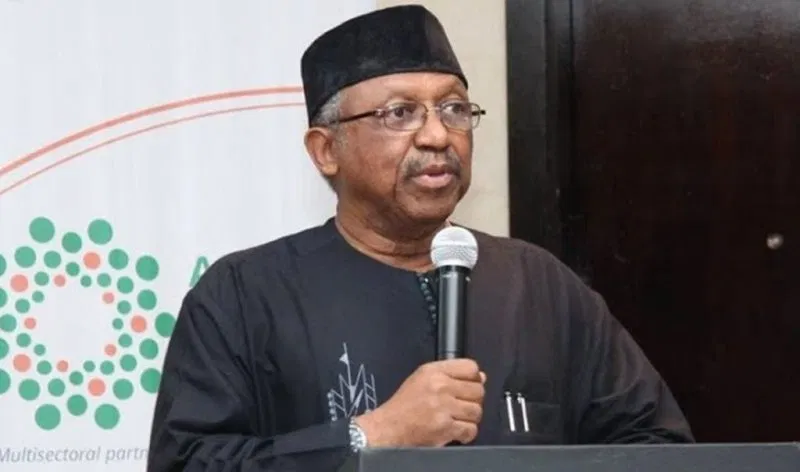By Zayamu Hassan
The Federal Government has explained the reason it decided to change the intention of the N10 billion it earlier released for domestic vaccine production in Nigeria.
The Minister of Health, Osagie Ehanire, disclosed this while responding to question in a flagship programme of Africa Independent Television (AIT), on Saturday, October 9 in Abuja.
It would be recalled that in January this year, the Ministry of Finance released N10 billion to support local COVID-19 vaccine production in the country
Confirming the release of the amount while speaking at the Presidential Task Force (PTF) COVID-19 briefing in Abuja, recently, Ehanire said: “The Ministry of Finance has released N10 billion to support domestic vaccine production.
“While we are working to develop our own vaccines, Nigeria is exploring options for licensed production, in collaboration with recognised institutions. We are also exploring the option of local production of the vaccines in the country.”
However, speaking yesterday, Ehanire said that the federal government has discovered that vaccine production was very difficult, hence, it would repurpose the amount to use it to attract investors.
According to him, the 10 billion was intended to procure vaccines made in Nigeria. “But making vaccine is not quite easy, so, we are looking at ways to repurpose that amount in order to use it to attract investors and for these investors to take us through the downstream sector of vaccine production, bring the technology which is the faster way of going at it before we migrate to the upstream to producing our vaccine.”
Responding to a question on why it is extremely difficult for the Nigeria to produce its own vaccine despite the fact that it has done so many years ago, the minister recalled that Nigeria was producing vaccines up to around 1992.
“We produce Small pox and anti-rabies vaccines and we were also able to satisfy the need of West African countries. But around 1992 things went flat when the production centre in Yaba was shut down for renovation and upgrading and never came back to life.
“Attempts were made as from 2005 to revive it but these attempts were not successful or serious and it took the administration of President Buhari to restart it, first with the partnership with the private sector we will inject technology and resources and an arrangement was set up for a company called Biovaccine Nigeria Limited, which is owned 49 per cent by the federal government to produce vaccines.
“Now the outbreak of the COVID-19 pandemic which stimulated the talk about vaccine and we then got in touch with the company to produce the COVID-19 vaccine, but the production of vaccine is not an easy thing.
“First, vaccines are not things that you can produce and put in the shop and tell people to go and buy, it has to be procured by government and you must be sure that there is an up-taker of what you have produce.
“Secondly, the technology for the production of vaccine is complicated. The complication lies around the fact that many tests need to be done before it will be injected into people and this test require clinical trials.
“Now, Nigerian scientists produced one or two vaccine candidates which are to undergo clinical trials to see if they are useable.
“The first option we are looking at is technology transfer from other countries and for that we have been talking with the WTO led by Ngozi Owella to see if we can get access to technology and resources and the federal government is also looking at ways of putting some money on the table to make it clear to potential investors that government is serious about production of vaccine.”
Speaking on the Emergency Medical Services scheme which will be funded through the Basic Health Care Provision Fund (BHCPF), the Minister said that plans have been concluded to launch the scheme starting from the Federal Capital Territory and few other states.
The project, according to him, will help reduce maternal, infant and even general mortality in the country.
“The Emergency medical services that we setting up is to the guarantee that help can come to you at no cost and you can be taken to special centre you don’t have to pay.
“All these will be funded from a purse of 5 per cent of the BHCPF which is in the law. It has been released to the country. It pays for the service. It has a private public partnership where private ambulances can take part and they are paid.
“We are working a system which allows us to know where is the nearest ambulance to the point of need.
“We are working with the NCC to allow us get a shot code that people can make the call to locate the nearest ambulances where they can take you to the hospital without you paying for the first 48 hours.
“Depending on the terrain, we are going to use boat and in, some instances, use helicopter to handle complicated cases which require transferring the patient to other places to handle.
“This is a huge plan that require a lot of preparation because we have never done this before in this country. We are looking at launching it towards the end of this year, beginning with the FCT and other few states to start the project.”
We believe it will be a game changer in reducing infant, maternal mortality and other mortalities where emergency services are needed.


